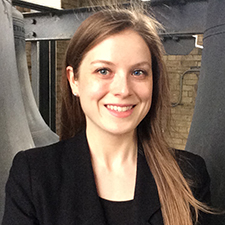CLIR Digital Humanities Postdoctoral Fellow

Elisa Tersigni (Ph.D. University of Toronto, 2018) completed her doctorate in English and the collaborative program in Book History and Print Culture. After graduation, she held the position of Digital Research Fellow for the Mellon-funded research project, Before ‘Farm to Table’: Early Modern Foodways and Cultures at the Folger Shakespeare Library and a Digital Research Fellowship at the John Rylands Library at the University of Manchester. She has extensive experience working in both digital humanities projects and with special collections, having completed an M.Sc. in Material Cultures and History of the Book at the University of Edinburgh, and has received grants to pursue research at dozens of libraries across Canada, the United States, and the United Kingdom. Her interests in digital humanities research extend across GIS mapping, textual analysis, transcription, and cataloguing of early manuscripts, and she is currently developing a new authorship attribution method that combines text analysis with GIS.
What I'm working on: “& use it at your pleasure”: Converting Food and Desire in Early Modern Europe
Elisa's project studies foods as religious entities and examines recipes as cultural contact zones in which religious and racial identities confront one another. It expands on the concept of the conversion narrative to consider the strategic conversion of foodstuffs, which carried with them the paradoxes of familiarity and otherness, pleasure and pain. She intends to publish her research with Dr. Danielle Sottosanti in a co-authored monograph which will consist of five chapters, one introductory and four case studies, each of which is focused on a foodstuff. The first will argue that foodstuffs, like people, could carry religious identities: Christian, Jewish, Muslim, and pagan. Four case studies will follow, on Licorice, Milk and Honey, Imperial Water, and Mushrooms. During the coming year, Elisa will complete the “Licorice” and “Milk and Honey” chapters, each of which will examine the tensions of the cultural association between food and medicine in the context of European Christian relations with Muslim and Jewish foodstuffs. The phrase 'at your pleasure' provides the opening of what will be a large-scale text analysis of manuscript recipe books at the Folger and the Thomas Fisher libraries, and of the Early English Books Online Text Creation Partnership (EEBO-TCP) collection, to collocate words signifying disgust and pleasure. This analysis will demonstrate how foodstuffs that were religiously and racially inflected as 'Other' became Christianized and appropriated over time.


